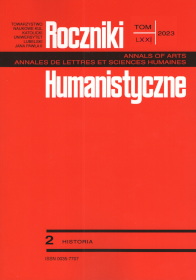Żywot Dulceliny z Digne jako źródło do badań nad pobożnością kobiecą w XIII wieku
The Life of Douceline of Digne as a Source for Research on Women’s Piety in the Thirteenth Century
Author(s): Paweł KrasSubject(s): History, Middle Ages, 13th to 14th Centuries
Published by: Towarzystwo Naukowe KUL & Katolicki Uniwersytet Lubelski Jana Pawła II
Keywords: Medieval piety; female religiosity; Beguines; Douceline of Digne; hagiography
Summary/Abstract: The aim of this article is to analyse the emergence, organisation and piety of the first communities of Beguines in Provence, referred to as the “Ladies of Roubaud”, whose initiator and leader was Douceline of Digne (ca 1215-1279), sister of the blessed Hugh of Digne, a charismatic preacher and one of the leaders of the Franciscan Spirituals. Against the background of the broad social and religious transformations at the turn of the 12th and 13th centuries, the author presents the life and activities of Douceline, which were described in detail in her Life (Li Vida de la benaurada sancta Doucelina). In many respects, this is a unique hagiographic text. It was written at the end of the 13th century in Provençal, and its author was Felipa of Porcelet, a pupil of and successor to Douceline. The Vida itself is preserved in a single copy, now stored in the Bibliothèque nationale de France under the reference number Fond français 13503. This hagiographic text functioned only within the Beguine communities established by Douceline and performed formative functions for their members. This article analyses the specific religiosity of Douceline of Digne, which was, on the one hand, inspired by the first “pious women” in the Low Countries, and yet, on the other, was primarily influenced by Franciscan medieval piety. In terms of structure and content, the Vida was modelled on the Life of St. Francis, compiled by St. Bonaventure. In this article, Douceline’s life is examined against the background of other hagiographic texts devoted to the Beguines, who in the thirteenth century promoted a new and highly popular ideal of female religiosity.
Journal: Roczniki Humanistyczne
- Issue Year: 71/2023
- Issue No: 2
- Page Range: 37-60
- Page Count: 24
- Language: Polish

